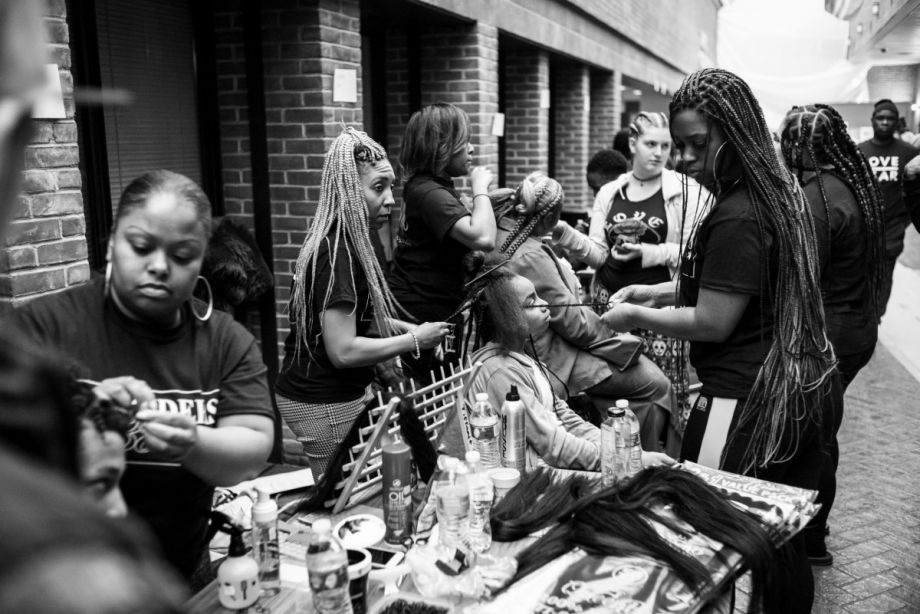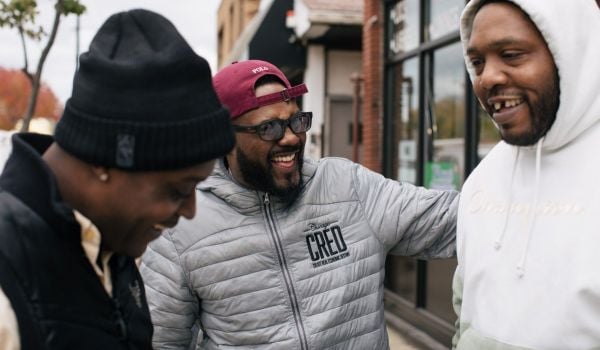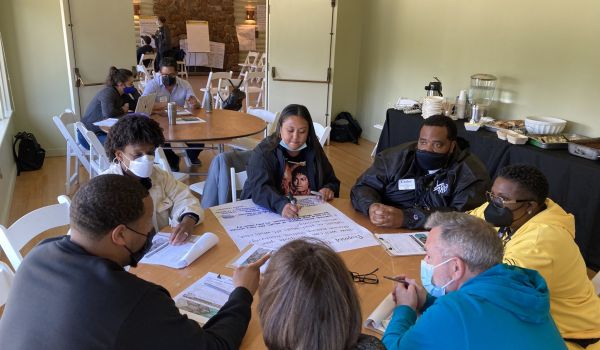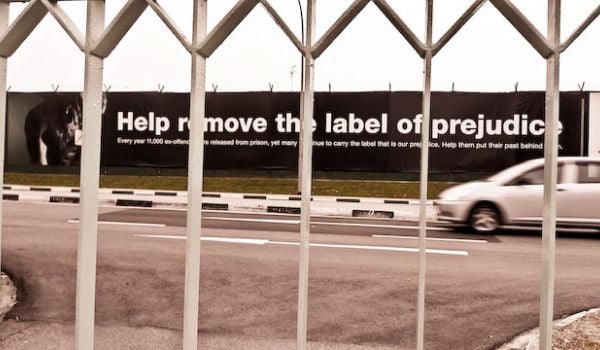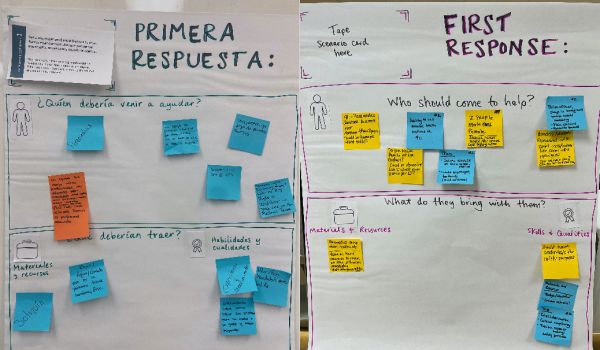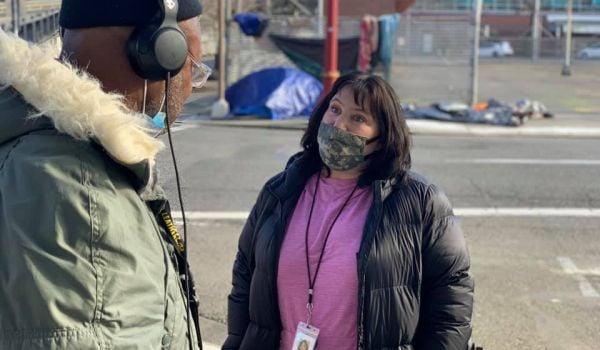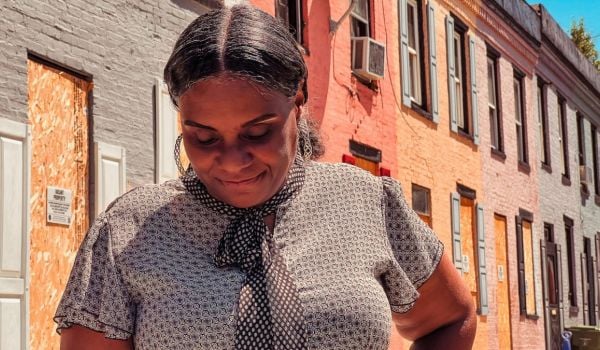The man in the blue baseball cap takes two steps, wobbles and then collapses onto the library floor. A woman rushes to his side and begins administering CPR. People gather around, unsure what to do next. The library security guard calls 911 but hangs back. Another woman kneels next to the man. She shoves a canister of Narcan deep into his nostril and takes over the CPR. After a few minutes the man regains consciousness and sits up.
His high is gone. But his life is saved.
“The first minute is key,” says Donna Bruce, the woman who administered the Narcan, a medicine used to reverse an opioid overdose. “If you don’t show up quickly, the airwaves close, the oxygen level is depleted, and they can die.”
Donna is a Registered Peer Supervisor, employed by the Penn North branch of the Enoch Pratt Free Library system in Baltimore. Her job is to help people struggling with addiction access resources like housing, employment, treatment and Narcan. Donna’s superhuman ability to connect with patrons comes in part from her many years using heroin and fentanyl.
“I know most of these people from when I ran these same streets,” she says. “Now they see me, and think, ‘If she can make it here, sober, employed, and looking this good, maybe I can too.”’
Donna was hired as part of a transformation in how Baltimore’s city government does business. In 2020, we became the first city in America to write trauma-informed care into law. I wrote the bill after a school shooting disrupted the lives and learning of children in West Baltimore. Young people testified at a City Council hearing that they were tired of leaders talking ad nauseam about policing, but instead wanted us to focus on preventing trauma.
“Valuing the mental health of students improves the safety of our school,” said Damani Thomas. A junior at the time, Damani heard the gunshots while ducking behind a desk in his classroom. A year later, then-Mayor Jack Young stood next to Damani and his peers and signed the Elijah Cummings Healing City Act into law in the same school where a hall monitor had been shot and wounded.
Mental health has suffered in cities, towns and rural communities since the start of the pandemic. According to the Centers for Disease Control and Prevention, drug overdose deaths increased by 30% between 2019 and 2020. This steep increase is likely due to anxiety, job loss, grief and physical isolation which restricts the touch points where support or lifesaving drugs like Narcan could be provided. As communities suffer, local elected leaders have struggled to find solutions.
From Detroit to Seattle, city leaders have begun exploring strategies to partner with community members and make naloxone and fentanyl test strips available to those who need it. In Newark, the city has worked to bring trauma-informed care to policing. In Pittsburgh, city officials are connecting first responders and social workers to address mental health crises.
Here in Baltimore, we have begun to train city agencies to recognize and reduce trauma. We hire expert practitioners from local organizations to help train and coach government employees to heal ourselves and those we serve. Groups like the Holistic Life Foundation teach deep breathing and mindfulness to library staff, while Roberta’s House helps employees process grief. Agency leaders participate in the training alongside frontline staff and then shift policies that are not aligned with a trauma informed approach.
Heidi Daniel, the CEO of the Enoch Pratt Free Libraries, decided to abandon the library system’s “Zero Tolerance” approach for anyone suspected of having used drugs, in favor of bringing in peer recovery coaches like Donna. Staff and patrons have reported a significant improvement in culture and people accessing services.
We have endeavored to implement the Healing City Act amidst a pandemic, a consent decree with the Department of Justice to correct patterns and practices of unconstitutional policing, and unremitting violence and overdose deaths.
One of those deaths was Devon Wellington, Donna’s son.
On July 24, 2021, police found Devon unresponsive in his truck. Cocaine was detected in his body. “When Devon died, my heart shattered,” says Donna. “Addiction is a generational curse. My mother passed it down to me, and I passed it down to my son. It lives on through our untreated trauma.”
I ask Donna if her work could help break the curse for other families. She pauses for a long moment.
“After we saved that young man with the baseball cap, he was angry,” she recalls. “He cursed me out. No one likes having their high taken away. But about an hour later he came back and apologized. He asked about treatment, and I connected him to one of the programs that helped me. Maybe the curse can be broken for his family.”
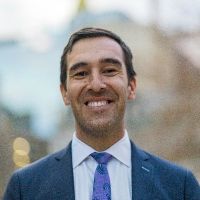
Zeke Cohen is a member of the Baltimore City Council and chair of the city’s Trauma Informed Care Taskforce. He also helps other cities across the country develop healing-centered practices with the Open Society Foundations.

